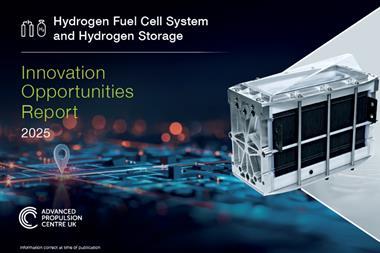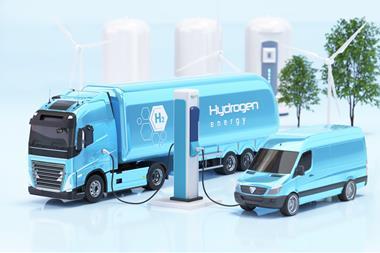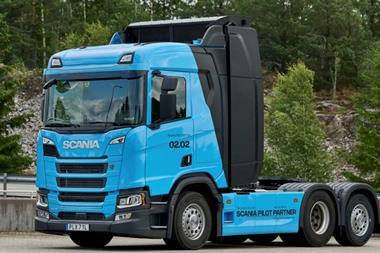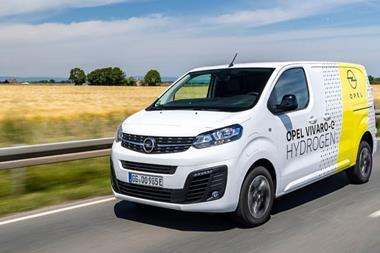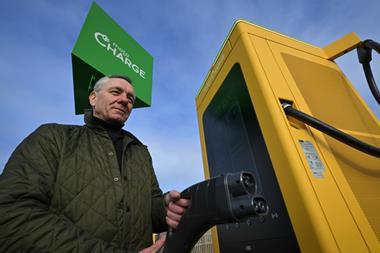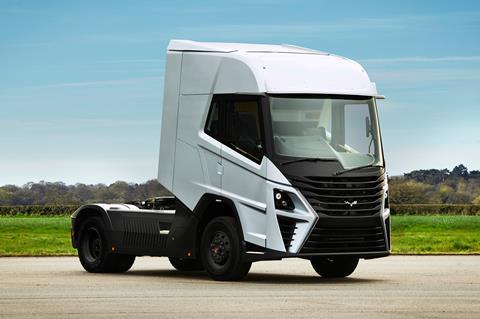
A haulage company that believes hydrogen-electric trucks are the future is ordering 30 tractor units from a start-up calling itself the UK’s first manufacturer of hydrogen fuel cell commercial vehicles.
Worksop, Derbyshire-based Explore Plant & Transport Solutions will deploy the lorries across the UK, with Hydrogen Vehicle Systems (HVS) providing driver training, maintenance, and “a hydrogen fuelling infrastructure” to support the operation. No timescale for deliveries is disclosed.
HVS, based in Glasgow and founded in 2017, has not yet produced any vehicles, but says its “innovative, zero-emission fuel cell technology”, which it says is more effective than battery electric alternatives, provides the transport industry with “the heavier payloads, longer range, and faster refuelling required of modern logistics operations looking to decarbonise their fleets”.
In April, it announced that it had begun building the first of several prototypes at a facility in Silverstone, Northamptonshire in partnership with engineering firm Fablink as a prelude to “series production”.
The company’s aim is to “disrupt the commercial vehicle industry by being an early mover with the most advanced, all-new, zero-emission HGV”.
Explore, which operates a truck fleet and offers plant hire, says it expects hydrogen-electric fuel cell vehicles to “revolutionise” the logistics sector. “These new HVS units will significantly reduce our carbon footprint, and this agreement underscores our commitment to advancing green technology within our business,” said operations director Chris Gatheridge.
Hydrogen propulsion works by splitting the molecule that makes up water – H20 – into hydrogen and oxygen. The hydrogen is then recombined with oxygen in a fuel cell to produce energy, with the process emitting just water rather than environmentally damaging carbon.
Many of the world’s traditional truck makers are designing hydrogen fuel cell-powered trucks as a more planet-friendly and convenient alternative to battery power which requires a supply of electricity for charging. However, only a small handful are in operation, and the technology is considerably behind that for electric vehicles.
A haulage company that believes hydrogen-electric trucks are the future is ordering 30 tractor units from a start-up calling itself the UK’s first manufacturer of hydrogen fuel cell commercial vehicles.
Worksop, Derbyshire-based Explore Plant & Transport Solutions will deploy the lorries across the UK, with Hydrogen Vehicle Systems (HVS) providing driver training, maintenance, and “a hydrogen fuelling infrastructure” to support the operation. No timescale for deliveries is disclosed.
HVS, based in Glasgow and founded in 2017, has not yet produced any vehicles, but says its “innovative, zero-emission fuel cell technology”, which it says is more effective than battery electric alternatives, provides the transport industry with “the heavier payloads, longer range, and faster refuelling required of modern logistics operations looking to decarbonise their fleets”.
In April, it announced that it had begun building the first of several prototypes at a facility in Silverstone, Northamptonshire in partnership with engineering firm Fablink as a prelude to “series production”.
The company’s aim is to “disrupt the commercial vehicle industry by being an early mover with the most advanced, all-new, zero-emission HGV”.
Explore, which operates a truck fleet and offers plant hire, says it expects hydrogen-electric fuel cell vehicles to “revolutionise” the logistics sector. “These new HVS units will significantly reduce our carbon footprint, and this agreement underscores our commitment to advancing green technology within our business,” said operations director Chris Gatheridge.
Hydrogen propulsion works by splitting the molecule that makes up water – H20 – into hydrogen and oxygen. The hydrogen is then recombined with oxygen in a fuel cell to produce energy, with the process emitting just water rather than environmentally damaging carbon.
Many of the world’s traditional truck makers are designing hydrogen fuel cell-powered trucks as a more planet-friendly and convenient alternative to battery power which requires a supply of electricity for charging. However, only a small handful are in operation, and the technology is considerably behind that for electric vehicles.






















